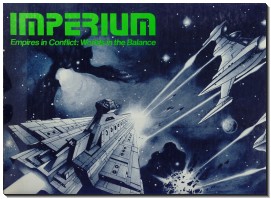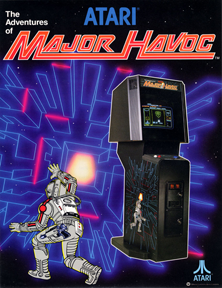
Warhammer 40,000 is a miniature wargame produced by Games Workshop. It is the most popular miniature wargame in the world, and is particularly popular in the United Kingdom. The first edition of the rulebook was published in September 1987, and the tenth and current edition was released in June 2023.

Nexus: The Jupiter Incident is a science fiction themed real-time tactics computer game developed by the Hungary-based Mithis Entertainment and published by HD Interactive. The game focuses on tactics and ship management instead of resource collection and base construction.

SolarQuest is a space-age real estate trading board game published in 1985 and developed by Valen Brost, who conceived the idea in 1976. The game is patterned after Monopoly, but it replaces pewter tokens with rocket ships and hotels with metallic fuel stations. Players travel around the Sun acquiring monopolies of planets, moons, and man-made space structures. They seek to knock their opponents out of the game through bankruptcy, as well as optional laser blasts and dwindling fuel supplies.

Space Crusade is an adventure board game produced by Milton Bradley together with Games Workshop and was first made in 1990. It was produced in the UK and available in some other countries including Finland, Ireland, France, Spain, Denmark, Australia, Hellas and New Zealand. In Germany, Italy, Belgium and the Netherlands, it is known as Star Quest.

Imperium is a science fiction board wargame designed by Marc W. Miller, and published in 1977 by the Conflict Game Company and Game Designers' Workshop (GDW). It features asymmetrical forces, each of the two sides having its unique set of constraints. The game came in a cardboard box illustrated with a space battle on the exterior. It included a cardboard-mounted, folding map of a local region of the Milky Way galaxy, a set of rules and charts, and the 352 counters representing the various spacecraft, ground units, and markers, and a six-sided die. A second edition was published in 1990, a third in 2001, and the first edition republished in 2004.
Federation Commander is a tactical starship combat board wargame system, produced and developed by Amarillo Design Bureau Inc. (ADB) It is designed to represent combat between vessels of various factions in the Star Fleet Universe, such as the United Federation of Planets and the Klingon Empire. The Star Fleet Universe is based upon a licence to use properties in the fictional Star Trek universe as it stood in 1979. Thus it includes the original series and the animated series as well as fan contributions but diverges from then and does not include anything from the movies or any subsequent television series. Much of the combat in Federation Commander is said to take place around the time of the fictional "General War", a large scale conflict in the Milky Way that involved prolonged conflict between a multitude of star-faring cultures.

Shatterzone is a space opera role-playing game by West End Games. The game went out of print in 1997 after the company went bankrupt. The game is now back in print, owned and published by Precis Intermedia.

Oolite is a free and open source 3D space trading and combat simulator "in the spirit of" Elite, a similar game published in the 1980s. The name is a contraction of object oriented Elite, because it was written in Objective-C, an object-oriented programming language. Among Oolite's several similarities to its source, the gaming experience is enhanced by the context set in Elite's original manual, and the accompanying novella, The Dark Wheel. Oolite is licensed under GPL-2.0-or-later for the source code, while resources are dual-licensed under GPL-2.0-or-later and CC BY-NC-SA-3.0.

Dune is a strategy board game set in Frank Herbert's Dune universe, published by Avalon Hill in 1979. The game was designed by Bill Eberle, Jack Kittredge and Peter Olotka. After many years out of print, the game was reissued by Gale Force Nine in 2019 in advance of the 2021 Dune film adaptation.

Twilight Imperium is a strategy board game produced by Fantasy Flight Games and Asmodee in the genre of science fiction and space opera. It was designed by Christian T. Petersen and was first released in 1997. It is now in its fourth edition (2017), which has large changes over previous editions. It is known for the length of its games and its in-depth strategy. As of 2024, its compelling gameplay and enduring popularity have been hailed by Nerdist and Polygon as one of the "greatest board games ever made."

Sins of a Solar Empire is a 2008 science fiction real-time strategy video game developed by Ironclad Games and published by Stardock Entertainment for Microsoft Windows operating systems. It is a real-time strategy (RTS) game that incorporates some elements from 4X games; its makers describe it as "RT4X". Players are given control of a spacefaring empire in the distant future, and are tasked with conquering star systems using military, economic and diplomatic means.

Space Empires IV is a turn-based 4X strategy computer game developed by Malfador Machinations and published by Strategy First as part of the Space Empires series in which players control an alien race in an attempt at galactic conquest.
We the People is a board wargame about the American Revolution, published by Avalon Hill in 1993 and designed by Mark Herman. We the People was the first wargame to use cards as the primary way to control the pace and tempo of play, with a strong element of fog of war through the hidden card information. This started a new genre of wargames that have emphasized competitive play and a strong historical narrative.

Major Havoc is an arcade action game released by Atari, Inc. in 1984. A vector-based upright arcade cabinet, Major Havoc consists of several smaller game experiences played in succession, including a fixed shooter, platform game, and a lunar lander sequence. It was developed by Owen Rubin with some levels designed and tuned by Mark Cerny, who joined the development team approximately a year into the game's development.

Twilight Struggle: The Cold War, 1945–1989 is a board game for two players, published by GMT Games in 2005. Players are the United States and Soviet Union contesting each other's influence on the world map by using cards that correspond to historical events. The first game designed by Ananda Gupta and Jason Matthews, they intended it to be a quick-playing alternative to more complex card-driven wargames.

Race for the Galaxy (RftG), or simply Race, is a card game designed by Thomas Lehmann. It was released in 2007 by Rio Grande Games. Its theme is to build galactic civilizations via game cards that represent worlds or technical and social developments. It accommodates two to four players by default although expansions allow for up to six players, as well as solo play. The game uses iconography in place of language in some places, with complex powers also having a text description. While appreciated by experienced players for being concise, some new players find the icons difficult to learn and to decipher.
Shards of the Throne is the second expansion to the board game Twilight Imperium, both of which were designed and published by gaming company Fantasy Flight Games. It was released in May 2011.

Battlefleet Gothic: Armada is a real-time tactics video game developed by Tindalos Interactive and published by Focus Home Interactive. It is set in the fictional universe of Warhammer 40,000, and is specifically an adaptation of the miniature wargame Battlefleet Gothic by Games Workshop.

Arcs: Conflict & Collapse in the Reach is a space opera board game designed by Cole Wehrle, illustrated by Kyle Ferrin, and published by Leder Games in 2024 alongside Arcs: The Blighted Reach Expansion, a large expansion which significantly modifies the base game into a three-act legacy campaign. Its full retail release is expected in September 2024,though it also is set to appear at GenCon 2024 with a limited number of copies. In Arcs, players compete to gain the most points by fulfilling variable objectives, taking actions through a trick-taking system and using different dice to attack enemy starships, with each player possessing variable powers.















